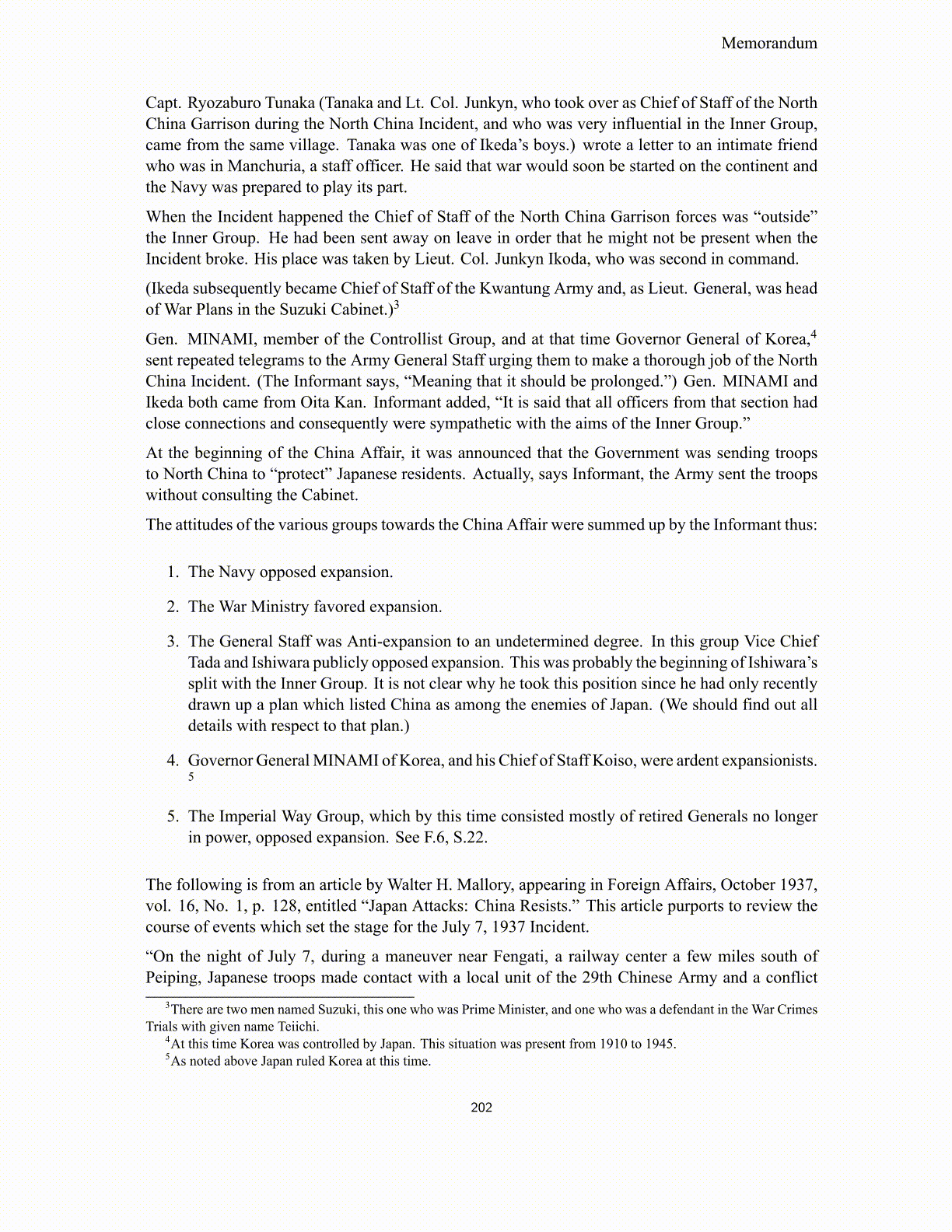
Memorandum Capt. Ryozaburo Tunaka (Tanaka and Lt. Col. Junkyn, who took over as Chief of Staff of the North China Garrison during the North China Incident, and who was very influential in the Inner Group, came from the same village. Tanaka was one of Ikeda’s boys.) wrote a letter to an intimate friend who was in Manchuria, a staff officer. He said that war would soon be started on the continent and the Navy was prepared to play its part. When the Incident happened the Chief of Staff of the North China Garrison forces was “outside” the Inner Group. He had been sent away on leave in order that he might not be present when the Incident broke. His place was taken by Lieut. Col. Junkyn Ikoda, who was second in command. (Ikeda subsequently became Chief of Staff of the Kwantung Army and, as Lieut. General, was head of War Plans in the Suzuki Cabinet.) 3 Gen. MINAMI, member of the Controllist Group, and at that time Governor General of Korea, 4 sent repeated telegrams to the Army General Staff urging them to make a thorough job of the North China Incident. (The Informant says, “Meaning that it should be prolonged.”) Gen. MINAMI and Ikeda both came from Oita Kan. Informant added, “It is said that all officers from that section had close connections and consequently were sympathetic with the aims of the Inner Group.” At the beginning of the China Affair, it was announced that the Government was sending troops to North China to “protect” Japanese residents. Actually, says Informant, the Army sent the troops without consulting the Cabinet. The attitudes of the various groups towards the China Affair were summed up by the Informant thus: 1. The Navy opposed expansion. 2. The War Ministry favored expansion. 3. The General Staff was Anti-expansion to an undetermined degree. In this group Vice Chief Tada and Ishiwara publicly opposed expansion. This was probably the beginning of Ishiwara’s split with the Inner Group. It is not clear why he took this position since he had only recently drawn up a plan which listed China as among the enemies of Japan. (We should find out all details with respect to that plan.) 4. Governor General MINAMI of Korea, and his Chief of Staff Koiso, were ardent expansionists. 5 5. The Imperial Way Group, which by this time consisted mostly of retired Generals no longer in power, opposed expansion. See F.6, S.22. The following is from an article by Walter H. Mallory, appearing in Foreign Affairs, October 1937, vol. 16, No. 1, p. 128, entitled “Japan Attacks: China Resists.” This article purports to review the course of events which set the stage for the July 7, 1937 Incident. “On the night of July 7, during a maneuver near Fengati, a railway center a few miles south of Peiping, Japanese troops made contact with a local unit of the 29th Chinese Army and a conflict 3 There are two men named Suzuki, this one who was Prime Minister, and one who was a defendant in the War Crimes Trials with given name Teiichi. 4 At this time Korea was controlled by Japan. This situation was present from 1910 to 1945. 5 As noted above Japan ruled Korea at this time. 202